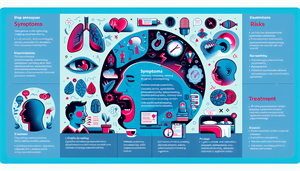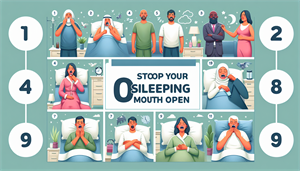Introduction
In today's fast-paced world, getting a good night's sleep is more important than ever. Quality sleep can boost your immune system, improve your memory, and increase your overall productivity. However, many people struggle with sleep issues, making it difficult to get the restful sleep they need. That's where sleep trackers come in. Sleep trackers are devices or applications designed to monitor and record your sleep patterns. They can provide valuable insights into your sleep duration, sleep quality, and the different sleep stages you experience throughout the night. By analyzing this data, sleep trackers can help you understand your sleeping habits and make changes to improve your sleep health.
Types of Sleep Trackers
There are several types of sleep trackers available, each with its own set of features and benefits. Here's an overview of the main types of sleep trackers:
Wearable Trackers
Wearable trackers, such as smartwatches and fitness bands, are among the most popular types of sleep trackers. These devices are worn on your wrist and use sensors to monitor your movement and heart rate. By analyzing this data, wearable trackers can estimate when you're awake, in light sleep, deep sleep, or REM (rapid eye movement) sleep. Some additional wearable sleep trackers include rings and fingertip devices worn at night. Many wearable trackers also come with additional features, like tracking your physical activity and heart rate variability (HRV), providing silent vibration alarms to wake you up gently, and even offering guided breathing exercises to help you relax before bedtime.
Bedside Devices
Bedside devices are sleep trackers that sit on your nightstand or are placed in your bedroom. They use various sensors to monitor your movement, ambient noise, and light levels. Some advanced models also monitor your breathing rate and heart rate using radio waves. Bedside devices can be a good option if you find wearable trackers uncomfortable to wear during sleep.
Under-Mattress Pads
Under-mattress pads are thin sensors that you place under your mattress. These trackers detect your movement, body heat, and heart rate through the mattress to gather data about your sleep. Under-mattress pads can provide detailed sleep analysis without the need to wear anything on your body. However, they might not be as precise as wearable trackers in detecting certain sleep stages.
Smartphone Apps
Smartphone apps are a convenient and low-cost option for sleep tracking. These apps use your phone's built-in accelerometer to measure movement during sleep. They may also use the microphone to detect snoring or other noises that might be disturbing your sleep. However, it's worth noting that the accuracy of smartphone apps can be variable and generally less reliable compared to dedicated sleep tracking devices.
Key Features of Sleep Trackers
Different sleep trackers come with a variety of features. Let's look at some of the key features you might find:
Sleep Duration
Most sleep trackers measure the total amount of time you sleep each night. This is typically broken down into periods of light sleep, deep sleep, and REM sleep.
Sleep Quality
Many sleep trackers provide a detailed analysis of your sleep quality, including the time spent in each sleep stage, interruptions during sleep, and the overall efficiency of your sleep.
Heart Rate Monitoring
Some sleep trackers can monitor your heart rate during sleep, providing insights into your overall cardiovascular health and stress levels.
Sleep Environment
Advanced sleep trackers may also measure ambient noise, light levels, and room temperature to assess how your sleep environment may be impacting your rest.
Snoring Detection
For those who struggle with snoring, some sleep trackers can detect and record snoring events, providing valuable information for addressing potential sleep disturbances.
Benefits of Using Sleep Trackers
Using a sleep tracker can offer several benefits for improving your sleep health:
Gain Insight into Your Sleep Patterns
By tracking your sleep over time, you can gain valuable insights into your sleep patterns and identify areas for improvement.
Inform Lifestyle Changes
With detailed data about your sleep, you can make informed lifestyle changes to improve your sleep quality, such as adjusting your bedtime routine or creating a more conducive sleep environment.
Spotting Potential Health Issues
Changes in your sleep patterns may indicate underlying health issues, and a sleep tracker can help you identify potential concerns early on.
Benefits of Combining a Sleep Tracker with a Snoring Mouthpiece
For individuals who struggle with snoring, using a sleep tracker in combination with a snoring mouthpiece can provide comprehensive insights into sleep quality and potential snoring issues.
Limitations of Sleep Trackers
While sleep trackers offer valuable insights, it's important to be aware of their limitations:
Accuracy
The accuracy of sleep trackers can vary, and some devices may provide more reliable data than others.
Data Interpretation
Interpreting the data from sleep trackers may require some understanding of sleep science and individual variability in sleep patterns.
Sleep Tracker Products
There are numerous sleep tracker products available on the market, each with its own set of features and limitations. It's important to research and compare different options to find the best fit for your needs.
Conclusion
Sleep trackers can be valuable tools for gaining insights into your sleep patterns and making positive changes to improve your sleep health. Whether you opt for a wearable tracker, bedside device, under-mattress pad, or smartphone app, there are numerous options to explore. By understanding the key features and limitations of sleep trackers, you can make informed decisions about incorporating them into your sleep routine.
FAQs: Exploring Sleep Trackers: Accuracy and Recommendations
If you have questions about the accuracy of sleep trackers or recommendations for specific products, explore our FAQs for additional insights.


